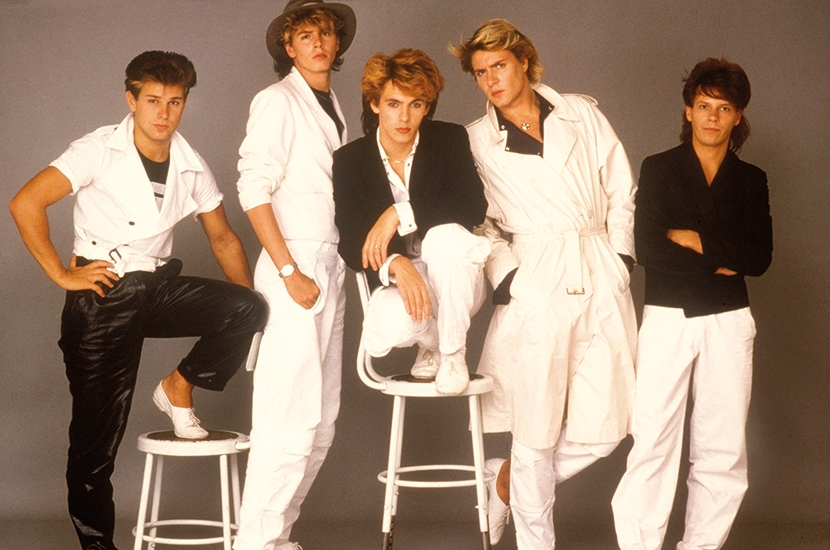In my second year at high school we were all deeply envious of a girl named Judi Taylor because, obviously, her name was only three letters away from John Taylor, the world’s most beautiful man, which meant she probably had the best chance of marrying him. I was thinking about this the other day just after I’d checked to find out if there were any VIP tickets left to see Duran Duran next year in London’s Hyde Park (there aren’t), when one of my daughter’s friends jumped in the car. ‘Hi, ‘she said. ‘I’m Charlotte Derulo. Well, I will be one day.’ Never underestimate the eternal passion of a tween girl.
As it turns out, Nigel John Taylor, a scrawny beanpole in thick glasses who only revealed himself as a god when he got contact lenses and joined a band, was far from good husband material, spending much of his time in Duran Duran absolutely off his box, numbing everything happening to him with extraordinary amounts of cocaine and alcohol. The fact that at 62 he still looks as handsome as ever is just one of those magic pop star things.
But a passionate fandom — and Duran Duran are still a cracking live band, full of fun and mischief, with alternately rousing or sinister songs that have held up infinitely better than the turgid musings of their arch-rivals Spandau Ballet — has its drawbacks: viz, thrown together cash-in books such as this one. When you think of how interesting music books have become — the morbid disgust of The Dirt by Mötley Crüe, the brilliant, life-affirming honesty of Elton John’s Me and the marvelous mosaic of Craig Brown’s 150 Glimpses of the Beatles — Please, Please Tell Me Now feels even more disappointing.
There’s a cracking story to be told here about a teenybopper band absolutely refusing to lie down and die, despite fashion, aging, changing times, boat accidents and divorce and money problems. Duran Duran have now been going in one form or another for nearly 45 years.
Alas, Stephen Davis’s book isn’t it. It simply recounts what happened to the band year by year: chart placings, live gigs, trashed hotel suites. There’s no sense of immediacy, of what it was actually like being there in a maelstrom. It also notably speeds up close to the end, in the manner of someone having an essay crisis. There are one or two interesting facts for fans — for example, that in 1985 it cost $45,000 to rent the top of the Eiffel Tower for an afternoon to shoot the View to a Kill video, and that when Nick Rhodes was told he was £2.5 million in debt he went straight out and bought another Picasso. But it has no broader appeal.
Davis is American, and the book is full of leaden Wikilifts for non-British readers, such as ‘change was coming to the political arena as well. In 1990 Margaret Thatcher’s premiership ended when her Tory party revolted. She had been the longest-serving British prime minister…’and so on. Davis also appears to believe that Duran Duran’s cover of ‘White Lines (Don’t Do It)’ was ‘well reviewed’ — spoiler, it was very much not — and that ‘We Are the World’ was a ‘better song’ than Band Aid’s, which is presumably why ‘We Are the World’ still gets played so much at Christmas.
[bnaner]
The other Taylors, Roger and Andy, are scarcely sketched after their initial biographical details. This is particularly disappointing in the case of Andy, whose mother abandoned the family and left him in a windswept fishing village on the north-east coast of England, in a childhood straight out of the 19th century. Otherwise, much is regurgitated from John’s lovely autobiography, In the Pleasure Groove, which itself, as John freely confesses, is made up of patchwork recollections.
Most frustrating of all is the lack of personal input from Rhodes, by far the most interesting band member. (Simon Le Bon comes across as bluff, sunny and sweet, exactly what you’d think Princess Diana’s favorite pop star would be like.) Little, pampered Nick was wearing make-up out and about in Birmingham from the age of 13, his parents buying him subscriptions to every fashion magazine he asked for. He was a friend of Andy Warhol, a lover of exceptionally tall women and an art-obsessive bankrupt. The only thing Please, Please Tell Me Now leaves you hungry as a wolf for is Rhodes’s no-holds-barred autobiography.
In the meantime, you’d be better off with your old copies of Smash Hits — the ones with the big hearts around John’s face and all of the Spands crossed out with black felt-tip pen.
This article was originally published in The Spectator’s UK magazine. Subscribe to the World edition here.

























